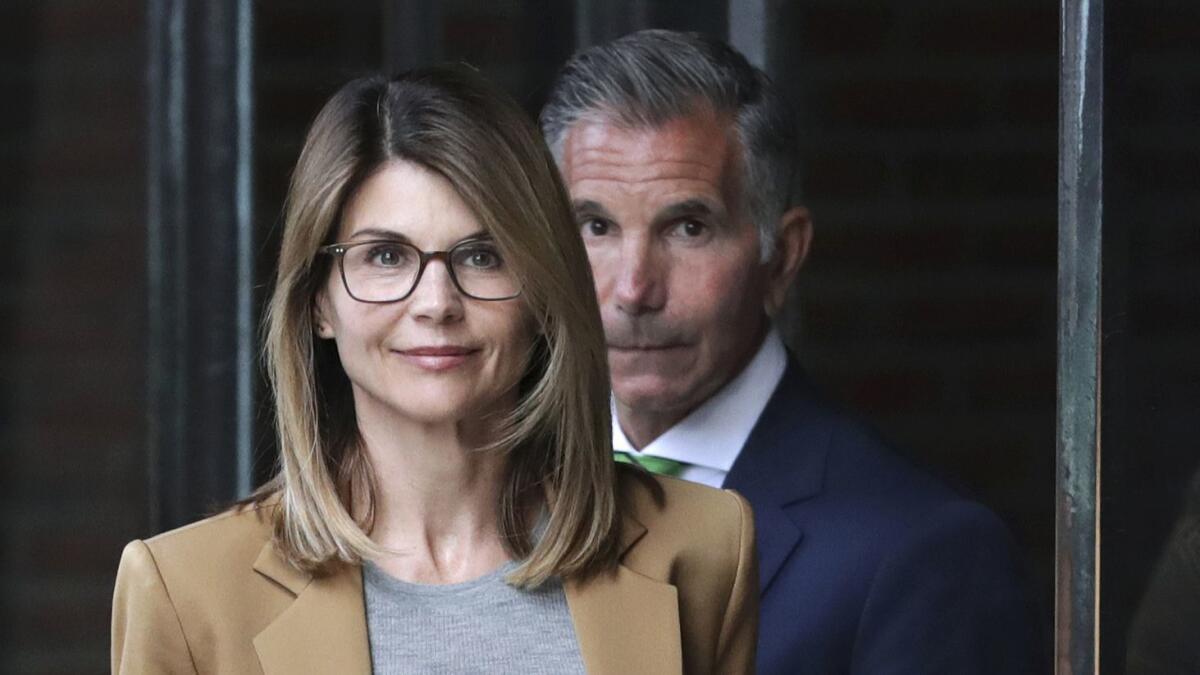Lori Loughlin told Rick Singer her daughters ‘love USC’ months before arrest in admissions scandal

- Share via
In November 2018, William “Rick” Singer picked up the phone in a government building in Boston and dialed a Los Angeles number. “Lori, it’s Rick Singer. How are you?”
“I’m good, Rick,” Lori Loughlin said. “How are you?”
“Good. The girls good?”
“They’re really good,” she said. “They love USC. They’re really happy.”
Approached by federal agents two months earlier and convinced to cooperate, Singer was recording the call. He turned to a practiced script: He was being audited, he told the actress, and the Internal Revenue Service was calling families who, like her and her husband, had donated to his foundation, purportedly to help “underserved kids.”
“So we — so we just — so we just have to say we made a donation to your foundation,” Loughlin asked, “and that’s it, end of story?”
“That is correct.” He wanted to give her a heads up, he explained, in case the IRS called.
“Ok, yeah. Ok. Totally. All right. So, so that’s it. So it’s — it’s the IRS. It’s not anyone from USC, it’s the IRS.”
“That is correct.”
Four months later, Loughlin and her husband, J. Mossimo Giannulli, were arrested and charged with conspiring to defraud USC. They have pleaded not guilty to three felony counts. Prosecutors on Tuesday made public a transcript of the call between Singer and Loughlin, among a cache of transcripts, emails, financial records and other documents they filed in court that had not been previously disclosed.
They add to the public’s knowledge of a scandal that has rocked academia and in which she has become a central figure.
What charges does Loughlin face?
The actress and her husband are charged with conspiracy to commit fraud, bribery and money laundering. They have pleaded not guilty despite coming under successive waves of pressure from prosecutors, who warned the couple and co-defendants that they would face more charges if they turned down a plea deal. Prosecutors from the U.S. attorney’s office in Boston have made good on that promise, twice leveling new charges against Loughlin and Giannulli.
What does the government say Loughlin did?
Loughlin and Giannulli conspired with Singer, the scheme’s confessed mastermind, to guarantee their two daughters’ admission to USC by misrepresenting them as rowing recruits, prosecutors allege. The couple took photographs of their daughters on rowing machines, paid Singer $400,000 and sent another $100,000 to a USC account controlled by Singer’s alleged conspirator, a USC administrator, prosecutors say.
The administrator, Donna Heinel, presented the girls to an admissions committee as elite rowers when she knew they were not, according to prosecutors. Heinel has pleaded not guilty to conspiracy to commit racketeering, fraud and bribery. She was fired on the day of her arrest from her post as the third-ranking official in USC’s athletic department.
What do Loughlin and Giannulli say they did?
The couple, through their lawyers, argue that they believed their payments to Singer’s foundation and a USC account were legitimate donations, not bribes that would suborn university employees.
The couple thought Singer’s charity was a bona fide nonprofit, their lawyers said in a motion, and that the money they wired to it would “support programs geared toward helping underprivileged children.” As for the checks to USC, they trusted the funds would go toward a “legitimate, university-approved purpose,” their lawyers wrote.
Singer’s Key Worldwide Foundation has since been exposed as a sham, with little use beyond funneling money from parents to coaches and test proctors on his payroll.
Who are the co-defendants?
Of the 36 parents charged in the scandal, 20 have pleaded guilty or said they plan to. One mother, Xiaoning Sui, was arrested in Spain and has not yet entered a plea; prosecutors are trying to extradite Sui, who is accused of paying Singer $400,000 to have her son admitted to UCLA as a phony soccer player.
Fifteen parents have pleaded not guilty, a group that includes some of the scandal’s most high-profile defendants: Loughlin and Giannulli; Bill McGlashan, a former private equity chief; Robert Zangrillo, a Miami financier; and Gamal Abdelaziz, a former casino magnate.
How does USC figure into this?
Eleven of the 15 parents who have maintained their innocence are charged with defrauding USC. As the cases inch closer to trial, the school’s admissions and fundraising practices — sensitive and to this point tightly guarded secrets — have come into sharper focus. Defense attorneys have argued that the school eagerly solicited donations and that their clients rightfully believed giving the school money made it far more likely their children would be admitted.
The government maintains that USC is a victim of fraud. It is one thing, prosecutors say, for a school to take into account the giving history of an applicant’s family; it is another for a family to secretly funnel money to an employee who helps admits a student who, but for their falsified credentials and the bribe, would have otherwise been turned away.
More to Read
Sign up for Essential California
The most important California stories and recommendations in your inbox every morning.
You may occasionally receive promotional content from the Los Angeles Times.










